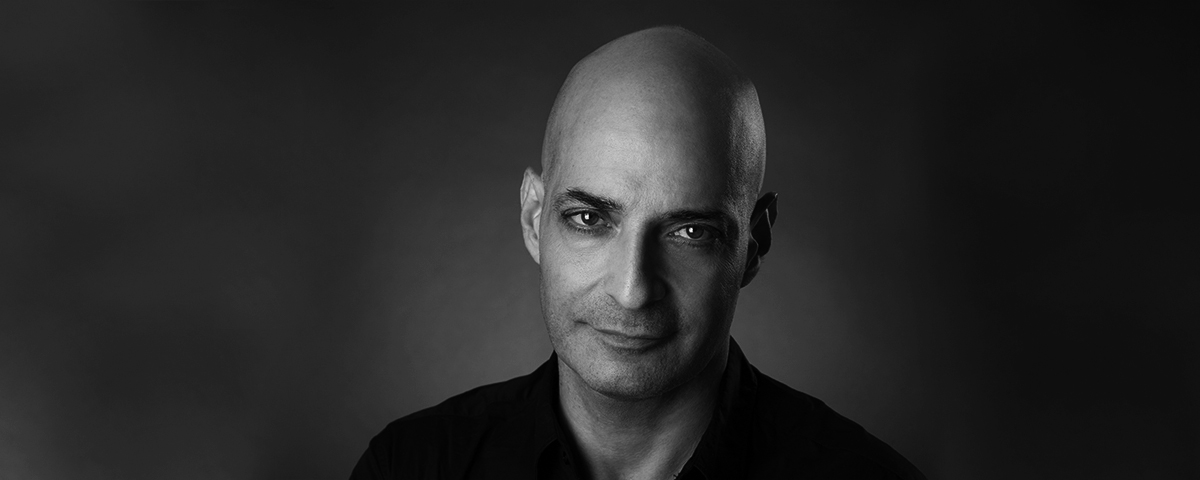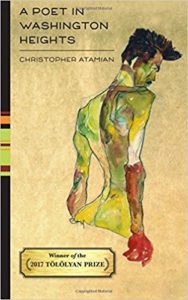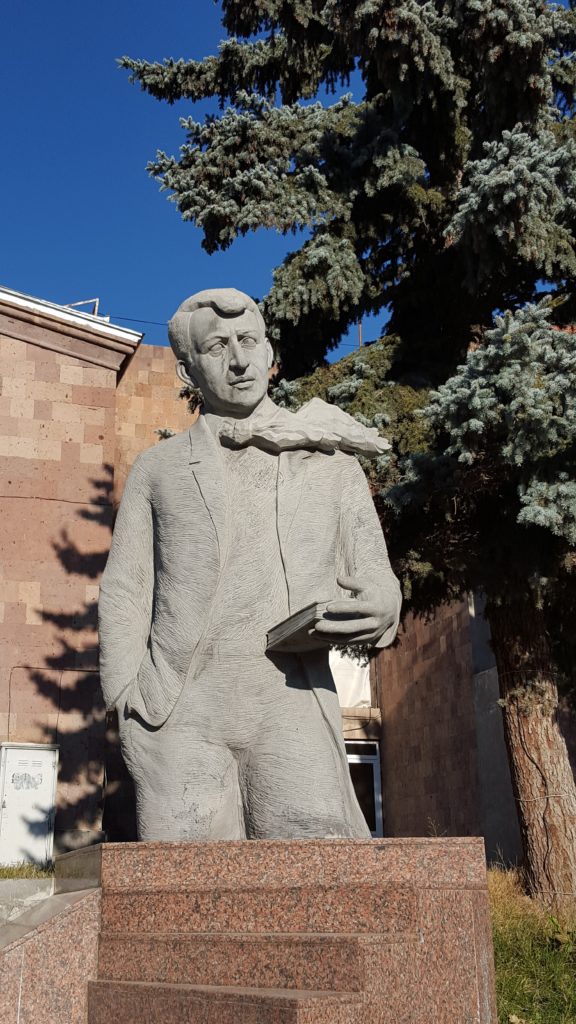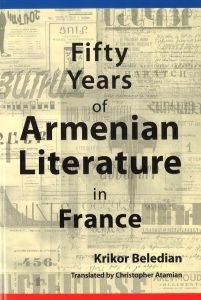
Special to the Armenian Weekly
By Aris Janigian
In 2011, writer and director Christopher Atamian’s pristine translation of Nigoghos Sarafian’s The Bois de Vincennes was issued, followed just last year by his monumental translation of Krikor Beledian’s Fifty Years of Armenian Literature in France. This extraordinary book details the lives and works of French Armenian writers from 1922 to the 1970s, their struggle for human relevance in the direct aftermath of the Armenian Genocide, and their evolving struggle for identity going forward.
Now, with A Poet in Washington Heights, the 2017 Toloyan Prize winner, we find Atamian engaged in another kind of translation—for translation is precisely the poet’s first task: putting the private language of feelings into a language that can be understood and openly shared.

Atamian’s book possesses all the devilishness and directness that one would expect from a first book of poems, making it a joy to read. The poems are about love, and mothers, the war in Syria, sexual longing, and sitting for coffee with friends; an array of subjects that employ an array of forms (there are even a few prose poems). Many of these poems use simple refrains that are bardic in flavor, and some of my favorites are those with loose rhyming schemes, as in: “Into the woods I go/full of hope/full of dope/I will not fast/I will not slow” or “They knifed the bishop dead!…./The First man, a Ramgavar said.” Or: “Driven like cattle from their homes/To be lit on fire in caves like unwanted gnomes/Or drowned in rivers by the nape/Disemboweled, raped.”
There is an atmosphere of controlled madness here, to the extent that, after a while, reading Atamian is like reading a 21st century American version of Rimbaud and Baudelaire. Like those two masters, his language and cadence marries playfulness with dead-seriousness, and what is scandalous with what is sacred.
Atamian is now three generations removed from the Armenian Genocide, but it is still a heavy concern. One generation removed, the two greatest Armenian-American writers, in my estimation, cousins William Saroyan and Archie Minassian, also dealt with these losses, but, mostly, in such a way that they were situated within the universality of human loss. They were village Armenians making their way into cosmopolitan America; now, we find cosmopolitan Americans like Atamian making their way back to villages in Armenia to see what they will find there, from fragments trying to recover what was lost, the fading memory of it. Even admitting their restive search for its elusive meaning.
Armenian-Americans are now among some of the finest poets working in the U.S. (It is a world-class shame that ARARAT is no longer around, and I would implore some of our more broad-minded benefactors to consider re-launching it).
We have Gregory Djanikian, and the recent Pulitzer Prize winner, Peter Balakian, but also those with first books, including the recent Anahid Award winner, Susan Barba, whose Fair Sun, is a remarkable read. But there are many more, working on the east and west coast, and everywhere in between, so much so, that this is the richest period of poetic production that I have seen in my lifetime, and now, with A Poet in Washington Height’s, Christopher Atamian has made an exciting contribution to our people’s literary treasury.
To get a better sense of Atamian, we had the following exchange.
***
Aris Janigian: Let me start with a question that might make you a little uneasy. Given how homophobic the Armenian community generally can be, how did it feel to write a book where your homosexuality is front and center?
Christopher Atamian: The issue is of concern to me only in so much as I hope to help open minds and educate whomever I can about LGBTQ rights in particular, and human rights in general.
And my personal experience has been that the younger generations of Diasporan Armenians (people 18 to 35) are increasingly open-minded. They reject homophobia and racism on a gut level, as they should. The Republic of Armenia is another story, as I discuss below.
Finally, I write for a general public, not just for Armenians. I write from my heart and from my intellect. How people react to my work—”reader reception theory” as elitist Comp Lit departments might term it—is not something that I can or care to control.
A.J.: Are you aware of the huge scandal that erupted in Armenia when James Russell, the Armenian Chair at Harvard, pointed out the homoeroticism in Charents’ poems?
C.A.: I have a vague memory that it may have caused some unease: But did people in Armenia really need James Russell to point out that Charents wrote homoerotic poetry? All you have to do is read his work to figure that out.

Of course, that type of response is the direct result of a critical blindness on the part of intellectuals in the Republic of Armenia, which stems from their having grown up in a homophobic and heterosexist society. Anyway, whatever their views on the subject at hand may or may not be, it does not change what Charents wrote. This attitude will change in time, one hopes. In fact, it has already begun to do so—if at a somewhat glacial pace—among younger Hayastansis.
By the way, I invited Russell to speak on Charents at AGLA NY [the Armenian Gay and Lesbian Association of New York] several years ago and he was well received by all—gay and straight.
A.J.: Sexual longing, longing for love, for what has been lost to you, and Armenians—all of that is in these poems; yet at the same time you are open to find in the smallest things, if not occasionally in the most scandalous things, the creative miracle of life itself, its unending exfoliation. Can you comment on that comment?
C.A.: Well what is the impetus to unite with another human being, either physically or otherwise, other than an attempt to find wholeness, to be completed in some way? We are social creatures by design and so we need others to both see ourselves reflected back and to share of ourselves. That is the very basis of community.
And yes, I think the world would be a qualitatively better place if more people saw the true miracle of life—the simple fact that a plant can grow from in between the cracks in a sidewalk, or that people in places like Syria still take joy in having children and living despite the unspeakable acts that their own leaders have visited on them. These to me are remarkable things. If you have ever had a near-death experience or become extremely ill and survive, you sense how precious life is, and how powerful the life instinct is.
It’s Nietzschean, Apollonian. It has nothing to do with religion or spirituality—it’s biological.

A.J.: There is a lot of religious imagery in your book—even a lot of religious feeling. Tell us about your relationship to religion.
C.A.: I am agnostic and I would be an atheist were it not for the fact that to me atheism is the flip side of deism, i.e. I cannot pretend to know something—and certainly not God’s existence or non-existence—with 100 percent certainty.
One of the most important books of the last 20 years was written by the late Christopher Hitchens: God is not Great: How Religion Poisons Everything. I don’t agree with everything he says, but if you look at the almost constant religious or religion-based wars that have been waged over the centuries and the religious animosity that still exists in many places—look at what is happening today to the Rohingyas and the Yazidis—you have to wonder what effect religion ultimately has on the world.
That being said, people have every right to be religious as long as they don’t impose their views on others on a personal or social policy level or discriminate against others because of their religious affiliation.
The references to religion in A Poet in Washington Heights—and I don’t actually think there are that many—are mainly historical: the 1933 Christmas Eve murder of Archbishop Tourian; the reference in “Mixobarbarians” to Jansenism. Look, you cannot change the past—the Jesuits, Jansenists, the Jewish prophets, Christian theologians, Buddha—take your pick—all shaped who we are today. That being said, I believe in science.
To me, church is a quiet place to find peace of mind, good incense, and if one is lucky, a sense of community with people of a shared history. Religion itself, paradoxically, has little to do with it for me. I am constantly surprised to see that religious people are often among the most intolerant, be they Christian fundamentalists, ultra-Orthodox Jews, or modern-day Islamists. Religion should unite people, not separate them; it should accept difference and not condemn it.
As for my poem “Holy,” it is written more in the spirit of the Beat Generation. The word “Holy” which is repeated throughout is meant in the sense of things we hold sacred. The sacred and the profane have always been with us—to me these feelings partake of but are not synonymous with the religious.
A.J.: History and memory, your own, Armenians’, is something you refuse, in these poems, to let slip into oblivion. But too much history and memory can paralyze a people as well, no?
C.A.: I agree and disagree. Along with other intellectuals and thinkers such as Marc Nichanian and the now sadly departed curator Neery Melkonian, I have always railed against genocide obsession in Armenian cultural production and society—because, let’s be frank, I think that is what you are really talking about.
To my mind, it’s not so much what you write about but how you write about it. Meaning if you produce fresh, interesting work on an old topic, then hooray! Interestingly enough my friend the therapist Susan Adler sent me a jubilant email after reading the book. Part of what she admired was finding someone “with historical memory that went back more than ten years.”
Armenians have had a particularly hard time moving forward while simultaneously looking backwards, especially given the brutal nature of the persecution that they experienced in the Persian and Ottoman Empires. Being forward-thinking while not forgetting the past: it’s a hard act to pull off. Sarafian warned us of this in a prescient poem: “Don’t look back or you will end up like Lot’s wife,” i.e. turned into a pillar of salt.
A.J.: Career poets (in what they call the “Po-Biz”), those that take MFA’s and workshops and hobnob at conferences, try to get their first book out by their early 30s, at the latest. You didn’t do any of the things you’re supposed to do on your way to becoming a professional poet. At the same time, one gets the sense that these poems have been forming inside of you for a very long time. Is there a value in avoiding all that “Po-Biz’, doing your own thing, and biding your time until the moment is ripe?
C.A.: That’s a complex question, so let’s take this one step-by-step.
Firstly: You are right; these poems have probably been germinating inside my mind and my body on a somatic level for a long time—how long? I cannot tell you for certain.
Secondly, age per se is uninteresting to me. Some people mature artistically at 20, others at 60. America is youth-obsessed and careerist by nature—no one has ever asked me about my age or qualifications in Europe for example: They just read the work.
Thirdly, I am a writer. I never intended or wanted to be a “career poet.” I translate, write journalism and criticism, and I write, direct, and produce films, television, and theater/musicals. Part of my supposed late blooming into certain disciplines comes from the fact that I was born into an immigrant family that was patently un-artistic. My parents were very bright and read a lot but they never encouraged me to pursue artistic activities. And certainly, the idea that you could make a living as a writer was never in their consciousness. If I look at my extended family, including my cousins, we have a dentist, two attorneys, a talent agent, an engineer/electrician and a banker. I am the only writer and/or filmmaker.
Now finally, regarding the whole MFA/”Po-Biz” issue: I find careerism of any type to be generally repulsive, which doesn’t mean that I do not envy or respect people who have always known what they wanted to do and who pursue their goals single-mindedly. But poetry especially is not a business. You know Aris, to draw a somewhat relevant parallel, I was for many years one of the leading dance critics in the country—by which I mean there were about 20 of us who wrote all the reviews and criticism in that field that mattered—apart from places like Dance Magazine. I served as the Dance Editor at The New York Press for several years. So, I saw a lot of dance. A lot of it was good, but a lot of it was also godawful. Every second dancer who came out of Juilliard or NYU thought they had the chops to be a choreographer—and no one told them otherwise, in part because we’ve become academically and professionally slack, we don’t want to hold people to standards. I never got an MFA in poetry writing—though I did attend USC Film School—so I really cannot comment on those programs specifically.
So to come 360 degrees full circle: Yes, I would prefer to have more of the type of connections that people in the “Po-Biz” have—but I don’t, so I am trying to make them now. As for the expression “Po-Biz,” given how little money most poets make, it’s a great double entendre!
You do what you can, when you can. And then you hope for the best.
***
Purchase your copy of Atamian’s A Poet in Washington Heights on Amazon.
Author information
The post The Armenian Poet of Washington Heights appeared first on The Armenian Weekly.
Source: Armenian Weekly
Link: The Armenian Poet of Washington Heights
